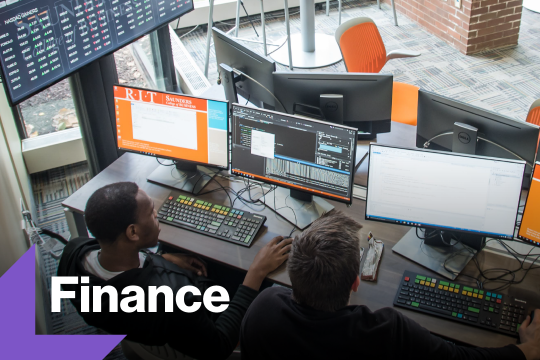Finance Minor
- RIT /
- Rochester Institute of Technology /
- Academics /
- Finance Minor
Featured Work and Profiles
-
Finance Student Moderates Conversation with Fed Reserve Bank of NY President
Owen Cavo ‘26 (finance, MIS) moderated a Conversation with Federal Reserve Bank of NY President/CEO John C. Williams at RIT, September 29, 2025. Students were invited to have lunch with President...
Read More about Finance Student Moderates Conversation with Fed Reserve Bank of NY President -
Research Insights: Strength in numbers?
Sriniwas Mahapatro How co-CEOs can lead successfully—or not
Read More about Research Insights: Strength in numbers? -
RIT students win international Bloomberg trading competition
In just its second year competing, a trio of RIT students won the 2024 Bloomberg Global Trading Challenge as the “Tigers Trading” team.
Read More about RIT students win international Bloomberg trading competition -
Research Insights: Benefits of a seeming monopoly
Hao Zhang How common institutional ownership reduces stock price crash risk
Read More about Research Insights: Benefits of a seeming monopoly -
Dynamic Courses, Co-ops, and Study Abroad Prepared Saunders Grad
Machelle Boisvert ’23 ’23 Goldman Sachs | Dallas, Texas, "Saunders College of Business does a great job of preparing students for the job market through dynamic course offerings, emphasis on co-ops for practical experience,...
Read More about Dynamic Courses, Co-ops, and Study Abroad Prepared Saunders Grad -
Research Insights: Board reforms improve financial reporting
Rong Yang Bringing higher audit fees and increased transparency
Read More about Research Insights: Board reforms improve financial reporting
Curriculum for 2025-2026 for Finance Minor
Current Students: See Curriculum Requirements
Related News
-
February 7, 2025

Bloomberg Enriches Financial Education for 10,000 Students through Global Trading Challenge
Bloomberg reports on the RIT team that won the 2024 Bloomberg Global Trading Challenge.
-
August 6, 2024

Business Exploration Provides Business Exposure to First-Year Students
The business exploration program at Saunders College of Business is your opportunity to spend up to a year and a half taking fundamental business courses and meeting with faculty, staff, and career advisors before selecting from one of the college’s seven, nationally-ranked, business majors.
-
August 6, 2024

FinTech and Analytics Providing Competitive Edge for Corporate Finance
A finance degree from Saunders College involves the management, creation, and study of money, banking, investments, assets, and liabilities.
Contact
- Matthew Cornwell
- Associate Director of Student Services
- Student Services
- Saunders College of Business
- 585‑475‑6916
- mcornwell@saunders.rit.edu
Saunders College of Business
















